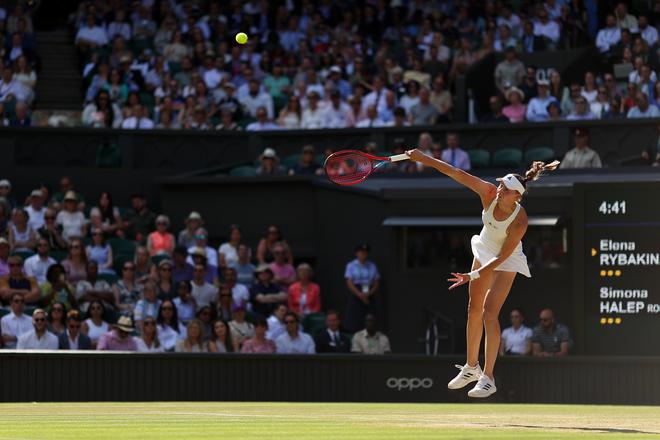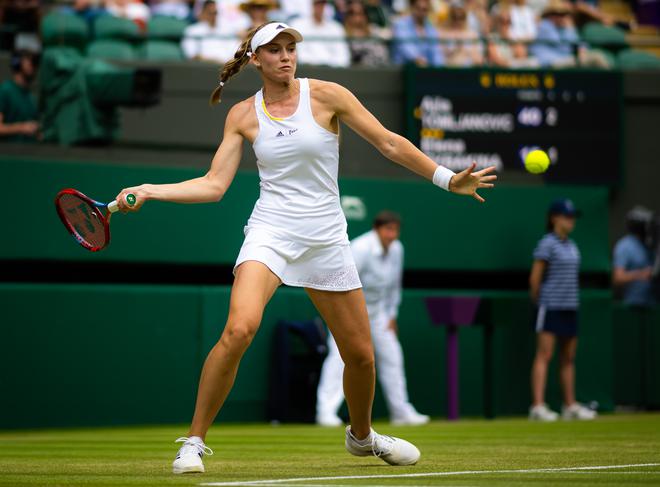

On the surface, there was little about Elena Rybakina’s statistical past that suggested she would have the tournament she had at Wimbledon.
The 23-year-old had won just two of the 61 events she had entered, with a 2-6 win-loss record in finals. She had yet to claim a WTA 1000 title — the quality of the playing field at such events ensures that success there is a reasonable indicator of the potential to do well at a Major.
Before Wimbledon, Rybakina was 17-11 in Grand Slam matches and 11-6 on grass — win-rates ranging from 60-65% aren’t to be disdained, but they do not belong in the elite bracket. Moreover, she had struggled in the build-up to the Major, winning just one of three grass-court matches.
So, it was no surprise that the bookmakers didn’t think highly of her odds of going all the way. They had her as a 100-1 outsider before the tournament got underway.
When she did triumph, the World No. 23 became the second-lowest-ranked women’s champion at the grass-court event in the professional era, which began in 1968. In this time, just one woman ranked lower than Rybakina has won Wimbledon — Venus Williams in 2007 at No. 31, although she had been No. 1 and already won three of her five career Wimbledon trophies.
“I did not expect to be in the second week of a Grand Slam at Wimbledon,” Rybakina admitted, suggesting that those who had predicted her chances, based on analytical measures of her record until then, had not differed significantly from her own expectations.
But if you had dug a little deeper into her statistical past and subjected her style of play to the ‘eye test’, there were signals that she could be dangerous, especially on faster courts.
Rybakina has a winning record (7-6) against players who have been ranked No. 1. She also has victories over Major winners, including Serena Williams, Garbine Muguruza, Sofia Kenin and Simona Halep — she added Bianca Andreescu to the list and beat Halep again, at Wimbledon.
Dictating play
Given Rybakina’s playing style, the match is often on her racquet. She has ‘the big game’, with access to rangy, point-ending power through both her serve and flat groundstrokes. One coach described Rybakina as “a right-handed Petra Kvitova” and there are certainly similarities in how both players dictate play — and blow hot and cold.
“It’s effortless the power I have,” Rybakina said. “I never compare myself with anyone. I just know that I have this gift. I’m tall and I play really fast. It’s not something I’m working in the gym or something. This is my weapon, and I’m just trying to use it as much as I can.”
At 1.84 metres (slightly over six feet), Rybakina is among the tallest players in the women’s game and she puts that height to good use: over the last three seasons, she has twice led the tour in aces and was fifth on the other occasion. She pounded a tournament-leading 53 aces at Wimbledon and also unleashed the edition’s second-fastest serve: 122mph (almost 200kmph).
So what changed between being another youngster with the weapons to threaten the best and being able to deploy them strategically over two weeks to become a Grand Slam champion?
“The last three years … I had very good matches, great battles, against great champions, and it was always close. In those close moments I was the one who would lose the serve or just miss. Maybe it mentally clicked [this time]. I believed in myself more in this tournament and in the crucial moments I was just solid enough to win,” Rybakina said.
In addition to overcoming the mental challenges of breaking through on the biggest stage, she also had to deal with being questioned about her Russian roots right through the tournament. With Russian and Belarusian players banned from the grasscourt Major following Russia’s invasion of Ukraine, the Moscow-born Rybakina would have been excluded had she not switched allegiance from Russia in 2018 for better funding and support.
Topic of discussion
Shifting allegiances isn’t normally controversial, but Rybakina’s move to play for Kazakhstan was a frequent topic of discussion at her press conferences. “I would say I’m lucky in this because the Kazakhstan federation, they were looking at the same time for [a] player to help,” Rybakina said, “and they believed in me, so I was just lucky [that] we just found each other like this.”
Rybakina has been guarded in her comments on the invasion. “I just want the war to end as soon as possible. Peace, yeah,” she said after her quarterfinal.
But with the Russian Tennis Federation quick to claim Rybakina as “our product” — its president Shamil Tarpishchev told sports website Championat that “it’s the Russian school after all” — she was pressed on the issue after her triumph.
“I don’t know what’s going to happen. It’s always some news, but I cannot do anything about this,” she said, when asked if the Russian government would be tempted to politicise her victory. “I’m playing for Kazakhstan a very long time. I represent them in the biggest tournaments, Olympics, which was a dream come true.”
Rybakina, whose parents live in Moscow, was reluctant throughout the tournament to elaborate on how much time she spends in Russia, saying instead that she lives on the tour. Invited to condemn Russian President Vladimir Putin and the invasion, Rybakina pleaded for understanding. “I didn’t choose where I was born. Kazakhstan supported me so much. Even today I heard so much support. I saw the flags. So I don’t know how to answer these questions.”
Rybakina’s win is the culmination of a long-term plan for tennis in Kazakhstan. The oil-and-gas-rich Central Asian nation has a long tradition of homegrown success in sports such as boxing and cycling but has often relied on recruiting talented tennis players from Russia.
Rybakina made the switch at 19 when her career stalled because of financial issues. The Kazakhstan Tennis Federation stepped in with an offer — represent it in exchange for the cash needed to support the global lifestyle of a tennis player. That decision four years ago has the potential now to transform tennis in the country, given she is Kazakhstan’s first singles Major winner and was a step away from winning Olympic bronze in Tokyo, losing the playoff match.
What’s next for Rybakina? Can she reprise her Wimbledon form at other Majors or will she add to the growing list of one-time Grand Slam champions on the women’s tour?
Her Croatian coach Stefano Vukov told the BBC that she has the potential to keep on winning. “She is still raw in so many ways so it’s a long process. We started working together at the smallest events and here we are winning Wimbledon. It’s just the beginning,” he said.
“I was 100% sure she could win one,” Vukov added. “She was calm in big moments. I saw that she has this gift. Everybody feels the nerves but she’s a very clutch player and she showed me that from the first tournaments she ever played.”
Rybakina believes she will go to New York next month more confident about the US Open, where she has not made it past the third round in three attempts. “The goal for this year was to be top 10 and it’s still the same goal,” she said. “And to try to win another [Major]. I don’t think yet about the US Open. So many good players and different players just won Grand Slams in the past so I really don’t know how I’m going to feel. But for sure I think I’m coming there more confident.”
Rybakina’s success will, however, have some less pleasant effects: she now has a target on her back and will attract more attention as a tennis celebrity, something she doesn’t care for.
“Everybody is trying to help me because it’s the first time and there is so much attention,” she said. “It’s not easy for me, because I’m a calm person. I don’t really like to be in front of everybody. This part of the job is still tough for me, but hopefully everybody will help me improve in this, like I did in tennis. Let’s see. Hopefully it will get better and better.”







